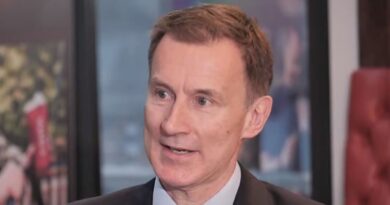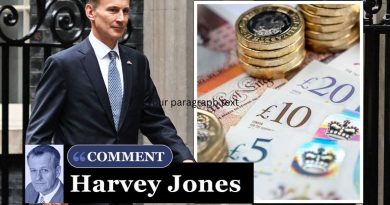House prices stagnate in May with 0.1% drop – full list of prices by region | Personal Finance | Finance
House prices stayed roughly the same in May, with a slight 0.1 percent drop compared to the previous month.
A typical UK home now costs £288,688, compared to £288,862 in April, according to the latest figures from the Halifgax House Price Index.
Looking at an annual basis, prices rose for the sixth consecutive month, increasing 1.5 percent for the year to May.
On an annual basis house prices rose for a sixth consecutive month, up by +1.5 percent vs +1.1 percent in April. The average property price now stands at £288,688.
Amanda Bryden, head of Mortgages at Halifax, said: “Market activity remained resilient throughout the spring months, supported by strong nominal wage growth and some evidence of an improvement in confidence about the economic outlook.
“This has been reflected in a broadly stable picture in terms of property price movements, with the average cost of a property little changed over the last three months.
“A period of relative stability in both house prices and interest rates should give a degree of confidence to both buyers and sellers.
“While homebuyers and those remortgaging will continue to respond to changes in borrowing costs, set against a backdrop of a limited supply of available properties, the market is unlikely to see huge fluctuations in the near term.”
These are the full list of house prices for May by region:
- East Midlands – £238,055
- Eastern England – £329,853
- Greater London – £536,821
- North East – £172,449
- North West – £232,258
- Northern Ireland – £191,767
- Scotland – £204,952
- South East – £384,871
- South West – £302,021
- Wales – £219,483
- West Midlands – £252,745
- Yorkshire and Humber – £206,351.
House prices increased the most in the North West, with a 3.8 percent yearly increase in prices for May.
Iain McKenzie, CEO of The Guild of Property Professionals, said it will be “reassuring” for both buyers and sellers that the market is stablising.
He explained: “There is now pent-up demand, particularly among first-time buyers who might be sitting on a deposit and waiting for interest rates to fall.
“Our members are seeing this on the ground, with transactions at their highest levels since early 2023. There has since been a rise in the number of properties on the market, and it’s likely that some buyers had been waiting for better mortgage offers to arrive.
“This elevated supply of housing has provided more choice for buyers, potentially lessening the urgency to buy quickly. Estate agents are reporting a more balanced market where buyers have more negotiating power.”
But he warned there are concerns around affordability and high living costs are keeping renters from accessing the property ladder.
He said: “With a shortage of affordable homes and thousands of council houses remaining empty, it would be beneficial to the property market to see a renewed commitment to build more affordable homes.
Chris Barry, director at UK-wide property conveyancing firm, Thomas Legal, said there has been an increased demand for property in recent weeks.
He said: “Since the election was announced, our enquiry levels are up by 20 percent.
“Given that house prices remain at dizzy heights and interest rates are at their highest level since 2007, this doesn’t quite stack up.
“We suspect the reason is partly pent-up demand and partly the growing desire among tenants to escape the rental market, where rents are increasingly astronomical.
“Perhaps the uncertainty in politics has made first-time buyers want the certainty of homeownership more than ever.”
For the latest personal finance news, follow us on Twitter at @ExpressMoney_.





